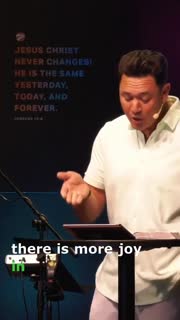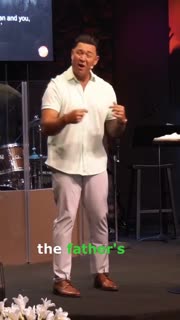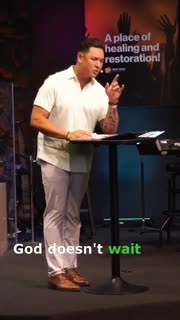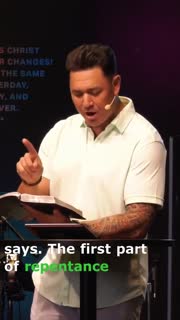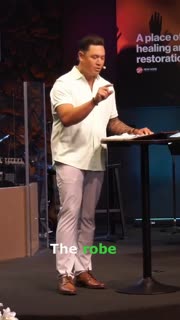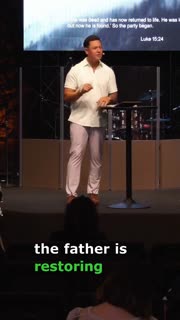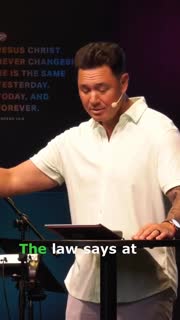Embracing Grace: The Father's Heart Revealed
Devotional
Sermon Summary
Bible Study Guide
Sermon Clips
### Quotes for Outreach
1. "There is more joy in heaven over one lost sinner who repents and turns to God than over 99 others who are righteous and haven't strayed away. This is the heart of the Father." (11 seconds)
2. "The father's heart was broken for his younger son. God's heart is broken for the lost. His heart is towards the sinner. It always has been. While he was a long way off, it says that the father ran to his son." (25 seconds)
3. "The father's love is the only thing that will ever truly, truly satisfy you. You can search. You can search. And you can have temporary moments of pleasure, searching, searching, but you're always left empty. Always. Because there is a hole inside of us designed to only be filled by, by God." (28 seconds)
4. "God doesn't wait for you to clean up, to come to him. See, some of you think, well, I got to get my act together. Are there some things that I got to put in place? I know there's some things I got to deal with. No, God says, come as you are, son, come as you are, daughter. Let me cover your sin. Let me cover your shame." (22 seconds)
5. "The law says he deserves condemnation. You deserve death. Which is eternal separation from God, right? We've talked about this. That's what death means. The wages of sin is death. But the free gift of God is eternal life through Christ Jesus, his son. You just have to receive him." (25 seconds)
### Quotes for Members
1. "The first part of repentance is that he comes to his senses. Verse 20 says this. So he returned home to his father. And while he was still a long way off, his father saw him coming. Filled with love and compassion, he ran to his son, embraced him, and kissed him. His son said to him, Father, I have sinned against both heaven and you. I am no longer worthy of being called your son." (34 seconds)
2. "The robe is that the father is restoring dignity to his son. He's covering his sin. He's covering his shame. This is a picture of forgiveness, complete forgiveness. Now you got to remember this. The son was filthy. He was just sleeping with the pigs, trying to feed off a pig slop, but the father didn't wait for him to clean up." (33 seconds)
3. "The ring is restoring identity into his son. You got to understand that this ring, it represents authority. This would be a signet ring that has the family crest on it that would allow this son to stamp things and seal things. He says, get the ring, restore his identity. This is no slave. This is no servant. This is my son." (26 seconds)
4. "The sandals is this. He's restoring his purpose. Sonship. You see only the lowest of slaves would possibly not have sandals for their feet. And the father saying, no, get sandals for my son's feet. This is what he's saying. Cause I need to equip him for the journey. There is a journey. I'm restoring his purpose." (28 seconds)
5. "The law says at best, we should be having a funeral right now. And even that, he should just be forgotten. Best, we should be having a funeral. But grace says no, we're having a party. For this son of mine who once was lost is now found. He's come home. The law says this, at best, even if you shouldn't receive him back, you should kill him. But at best, make him a slave. Make him a servant. But grace says no. He's my son. He's my daughter. And he's come home." (38 seconds)
Ask a question about this sermon
1. "There is more joy in heaven over one lost sinner who repents and turns to God than over 99 others who are righteous and haven't strayed away. This is the heart of the Father." (11 seconds)
2. "The father's heart was broken for his younger son. God's heart is broken for the lost. His heart is towards the sinner. It always has been. While he was a long way off, it says that the father ran to his son." (25 seconds)
3. "The father's love is the only thing that will ever truly, truly satisfy you. You can search. You can search. And you can have temporary moments of pleasure, searching, searching, but you're always left empty. Always. Because there is a hole inside of us designed to only be filled by, by God." (28 seconds)
4. "God doesn't wait for you to clean up, to come to him. See, some of you think, well, I got to get my act together. Are there some things that I got to put in place? I know there's some things I got to deal with. No, God says, come as you are, son, come as you are, daughter. Let me cover your sin. Let me cover your shame." (22 seconds)
5. "The law says he deserves condemnation. You deserve death. Which is eternal separation from God, right? We've talked about this. That's what death means. The wages of sin is death. But the free gift of God is eternal life through Christ Jesus, his son. You just have to receive him." (25 seconds)
### Quotes for Members
1. "The first part of repentance is that he comes to his senses. Verse 20 says this. So he returned home to his father. And while he was still a long way off, his father saw him coming. Filled with love and compassion, he ran to his son, embraced him, and kissed him. His son said to him, Father, I have sinned against both heaven and you. I am no longer worthy of being called your son." (34 seconds)
2. "The robe is that the father is restoring dignity to his son. He's covering his sin. He's covering his shame. This is a picture of forgiveness, complete forgiveness. Now you got to remember this. The son was filthy. He was just sleeping with the pigs, trying to feed off a pig slop, but the father didn't wait for him to clean up." (33 seconds)
3. "The ring is restoring identity into his son. You got to understand that this ring, it represents authority. This would be a signet ring that has the family crest on it that would allow this son to stamp things and seal things. He says, get the ring, restore his identity. This is no slave. This is no servant. This is my son." (26 seconds)
4. "The sandals is this. He's restoring his purpose. Sonship. You see only the lowest of slaves would possibly not have sandals for their feet. And the father saying, no, get sandals for my son's feet. This is what he's saying. Cause I need to equip him for the journey. There is a journey. I'm restoring his purpose." (28 seconds)
5. "The law says at best, we should be having a funeral right now. And even that, he should just be forgotten. Best, we should be having a funeral. But grace says no, we're having a party. For this son of mine who once was lost is now found. He's come home. The law says this, at best, even if you shouldn't receive him back, you should kill him. But at best, make him a slave. Make him a servant. But grace says no. He's my son. He's my daughter. And he's come home." (38 seconds)
